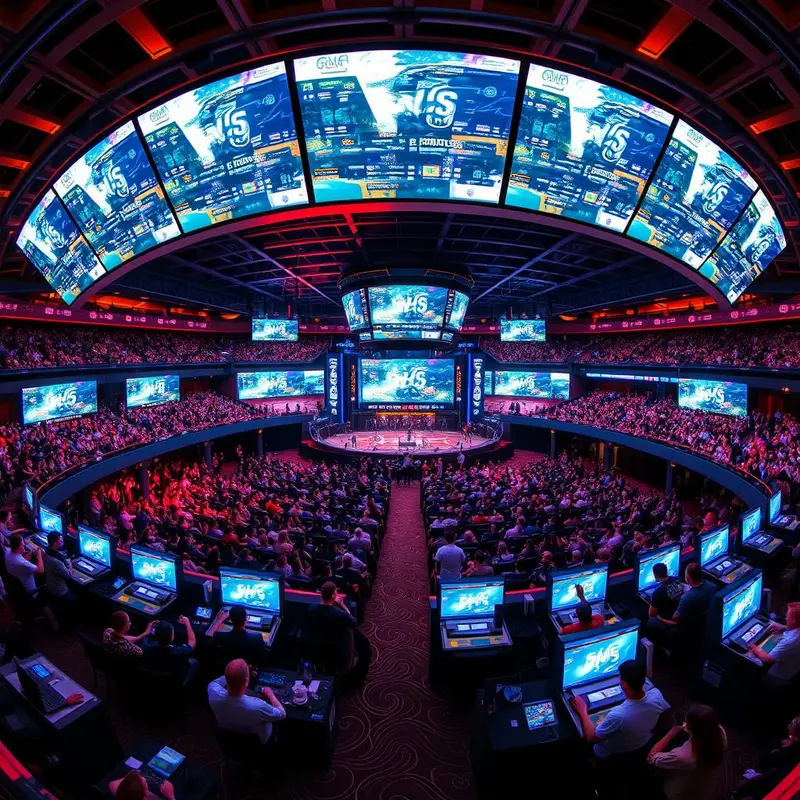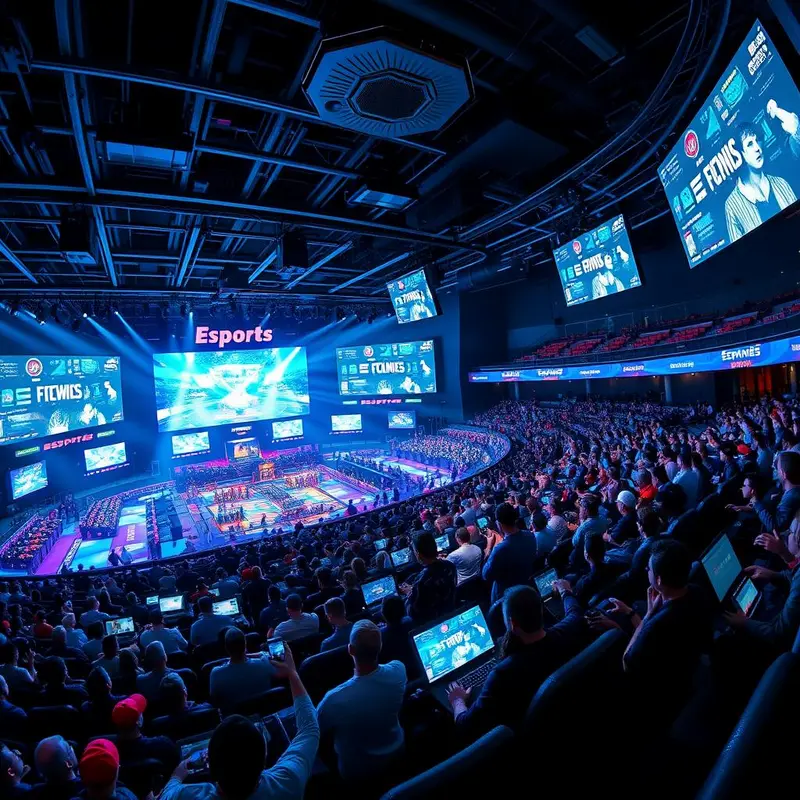The ascent of esports betting has made it a cornerstone in online gambling, captivating tech-forward audiences with its blend of gaming and traditional sports betting dynamics. As casinos seek diversification and new opportunities for users, two pivotal areas emerge for exploration: the intricate regulatory challenges betting operators face, and the growth trajectory that reflects shifting engagement patterns and market trends. This article delves into these dimensions, exploring what shapes esports betting, propelling it from an emerging trend to a solid staple in casino offerings globally.
Navigating the Legal Maze: Regulatory Hurdles in Esports Betting
The meteoric rise of esports betting as a global phenomenon has not come without its share of obstacles, particularly in the realm of regulation. As a relatively nascent industry compared to traditional sports betting, esports wagering operates in a landscape of evolving laws and fragmented policies that vary dramatically across jurisdictions. This regulatory uncertainty creates a challenging environment for operators and bettors alike, often leaving both grappling with unclear rules and inconsistent enforcement. Some countries have welcomed regulated esports betting with open arms, crafting frameworks to support its growth, while others impose strict bans or maintain ambiguous stances that stifle development. For instance, South Korea, a powerhouse in the esports world, enforces stringent gambling prohibitions, while India’s state-by-state approach results in a patchwork of legality. Even in China, with its massive esports audience, official betting remains heavily restricted due to complex government oversight.
The global nature of esports exacerbates these challenges, as tournaments and betting platforms transcend borders, forcing operators to navigate a tangled web of compliance requirements. In emerging markets like Brazil, newly established regulations offer potential but come with costly and burdensome certification processes. Any significant change to a betting platform often demands recertification, draining resources and time. Meanwhile, gray market operators exploit these gaps, targeting regulated regions without proper licensing and increasing enforcement risks for legitimate businesses. This compliance complexity underscores the need for adaptive strategies tailored to each market, often requiring local partnerships or joint ventures to meet high entry barriers and legal stipulations.
Beyond legal frameworks, integrity concerns cast a long shadow over esports betting’s credibility. The digital environment of competitive gaming, while innovative, is uniquely vulnerable to manipulation through match-fixing and cheating. High-profile scandals, such as recent investigations into irregularities in major game titles, have intensified regulatory scrutiny worldwide. Organizations like the Esports Integrity Commission work tirelessly to enforce anti-cheating measures, but the ease of altering digital outcomes compared to physical sports remains a persistent issue. Regulators and operators must collaborate to implement robust oversight mechanisms to safeguard fair play and maintain bettor trust.
Equally pressing are the challenges surrounding responsible gambling, given the younger demographic that dominates esports betting. Many enthusiasts encounter wagering for the first time through esports, often lacking a clear understanding of odds or betting markets. Traditional responsible gambling messages frequently fail to connect with this tech-savvy audience, necessitating tailored education initiatives. Stricter age verification processes have emerged as a response to underage gambling risks, but more must be done to protect vulnerable players in this space. Operators face the dual task of fostering engagement while ensuring ethical practices that resonate with their user base.
Market access barriers further complicate the picture, as regional restrictions demand bespoke business models. In some jurisdictions, high fees or outright prohibitions force operators to rethink their approach, often aligning with local entities to gain a foothold. The path forward for esports betting hinges on clearer legislation and proactive investments in compliance and integrity measures. As the industry matures, those who prioritize navigating this legal maze will likely emerge as leaders, setting the stage for sustainable growth. For bettors seeking guidance on safe and legal wagering, exploring resources like how to start gambling online can provide valuable insights into entering this dynamic yet complex world.
Riding the Wave: The Explosive Growth of Esports Betting
The esports betting landscape is undergoing a remarkable transformation, emerging as one of the most dynamic sectors in the online gambling arena. With a market size valued at around $0.51 billion in 2024, projections paint a thrilling picture of expansion, estimating a surge to $3.5 billion by 2029 and potentially $2.41 billion by 2033. This translates to an impressive compound annual growth rate of approximately 18.5%, reflecting a global appetite for wagering on competitive gaming that shows no signs of slowing down. Currently, about 74 million users worldwide are placing bets on esports events, a figure set to climb as accessibility and interest continue to grow.
What fuels this rapid ascent? A confluence of factors drives the esports betting boom, starting with the staggering viewership numbers that rival traditional entertainment among younger, digitally native audiences. High-profile tournaments and structured leagues, boasting substantial prize pools, draw millions of eyes and, consequently, millions of wagers. Technological innovation plays a pivotal role as well, with live in-play betting—accounting for up to 45% of bets on certain titles—and advanced analytics enhancing the user experience. The integration of cryptocurrencies further modernizes platforms, offering seamless transactions that appeal to tech-savvy bettors, a trend explored in depth at Bitcoin Casino Crypto Guide. Mobile gaming expansion, especially in emerging markets like Southeast Asia with titles such as Mobile Legends: Bang Bang, broadens the reach, while regulatory shifts, particularly in North America, pave the way for legitimized growth.
Regionally, the Asia-Pacific dominates with 55% of global revenue, underpinned by a massive gaming population and deeply ingrained mobile culture. North America, however, is hot on its heels, capitalizing on evolving legal frameworks that support online wagering. The games themselves are central to this narrative, with titles like Counter-Strike 2 commanding a 57% share of bets and a staggering 99% year-over-year growth. League of Legends follows with a 26% share and 61% growth, while Valorant’s meteoric 175% rise signals the potential of newer entrants. Dota 2 and mobile-focused games like PUBG Mobile also carve out significant niches, especially in developing regions where competitive scenes are maturing rapidly.
Betting behaviors reveal a preference for dynamic engagement, with live wagering becoming a cornerstone of the experience, especially among Counter-Strike enthusiasts. This shift toward real-time bets during matches underscores the interactive allure of esports betting, setting it apart from the more static pre-match wagers often seen in traditional sports. While the traditional sports betting market dwarfs esports with projections of over $187 billion by 2030, the latter is swiftly closing the gap among younger demographics who crave digital-first experiences. Operators are keenly aware of this trend, tailoring innovative offerings to retain and attract these users.
This explosive growth trajectory positions esports betting as a formidable player in the broader gambling ecosystem. It’s a space where constant tournaments, year-round action, and cutting-edge technology converge to create betting opportunities that feel both fresh and urgent. Yet, as the market scales new heights, it must navigate the complexities of maintaining user trust and adapting to diverse regional demands. The wave of esports betting is undeniably powerful, reshaping how we view entertainment and gambling in a digital age, and its momentum promises to carry it even further in the years ahead.
Final thoughts
Esports betting stands at the cusp of becoming a vital component of casino offerings, offering a unique blend of gaming and gambling. While it faces regulatory hurdles that require careful navigation and solutions, the sector shows no signs of slowing down. Its fresh appeal, combined with persistent technological innovation, provides a growth platform for operators. The challenge now for casinos is to embrace esports betting, meeting evolving industry standards while tapping into the vast potential this trend offers.
Ready to Elevate Your Gambling Experience to the Next Level? Contact www.topgamb.com today and let our expert team guide you to a more exciting betting adventure with top-notch tips and picks just for YOU! Discover your Winning Edge now!
Learn more: https://www.topgamb.com/casino-rankings/
About us
The website TopGamb.Com is a premier destination for understanding the world of online gaming. The site delivers in-depth casino reviews, expert rankings, and tips designed to equip customers with the knowledge needed to make astute casino selections. With a focus on critical factors like casino interfaces, gaming variety, and payout rates, TopGamb.Com ensures that users are well-informed to make their gambling choices more rewarding and enjoyable.















